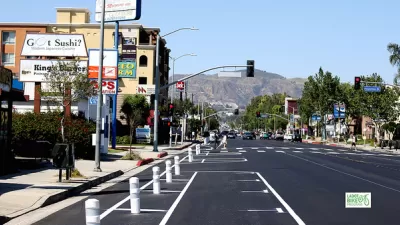Years of planning and strong political support aren't enough when the city council doesn't follow the letter of the law. Now opponents of L.A.'s Mobility Plan 2035 smell blood in the water.
"Faced with a lawsuit from a Westside nonprofit, several council members have concluded that they need to rescind the plan that was passed in August, make some quick changes and approve a slightly different version of the same document," reports David Zahniser.
The plan in question is called Mobility Plan 2035, and it was approved in August 2015. At the time, Zahniser called the plan a "new and controversial exercise in behavior modification." Since then a group of local neighborhood activists called Fix the City sued the city over the project, leading to this week's bureaucratic maneuverings.
The article offers another chance for politicians and activists to bring out their best soundbites—with the exception of Los Angeles Council President Herb Wesson, who declined to comment on the "do-over," according to Zahniser, "saying the issue is the subject of litigation."
Zahniser specifically describes how the Los Angeles political process fumbled the plan in its final stages of approval:
"At issue are three changes backed by the council in the run-up to its Aug. 11 mobility plan vote. Councilman Jose Huizar's planning committee added an amendment to ensure that the council, and not just the mayor's office, would be in charge of carrying out the plan, according to Fix the City's lawsuit. It also added language saying 'equity' should be a factor when deciding which transportation project is approved. Meanwhile, Councilman David Ryu won passage of a third amendment that said that public safety should be evaluated before approving changes to public streets."
According to Fix the City, those amendments necessitated review by the city's Planning Commission.
FULL STORY: City Council sets stage for a do-over on 20-year traffic plan

Planetizen Federal Action Tracker
A weekly monitor of how Trump’s orders and actions are impacting planners and planning in America.

Map: Where Senate Republicans Want to Sell Your Public Lands
For public land advocates, the Senate Republicans’ proposal to sell millions of acres of public land in the West is “the biggest fight of their careers.”

Restaurant Patios Were a Pandemic Win — Why Were They so Hard to Keep?
Social distancing requirements and changes in travel patterns prompted cities to pilot new uses for street and sidewalk space. Then it got complicated.

San Francisco Suspends Traffic Calming Amidst Record Deaths
Citing “a challenging fiscal landscape,” the city will cease the program on the heels of 42 traffic deaths, including 24 pedestrians.

California Homeless Arrests, Citations Spike After Ruling
An investigation reveals that anti-homeless actions increased up to 500% after Grants Pass v. Johnson — even in cities claiming no policy change.

Albuquerque Route 66 Motels Become Affordable Housing
A $4 million city fund is incentivizing developers to breathe new life into derelict midcentury motels.
Urban Design for Planners 1: Software Tools
This six-course series explores essential urban design concepts using open source software and equips planners with the tools they need to participate fully in the urban design process.
Planning for Universal Design
Learn the tools for implementing Universal Design in planning regulations.
Heyer Gruel & Associates PA
JM Goldson LLC
Custer County Colorado
City of Camden Redevelopment Agency
City of Astoria
Transportation Research & Education Center (TREC) at Portland State University
Camden Redevelopment Agency
City of Claremont
Municipality of Princeton (NJ)





























